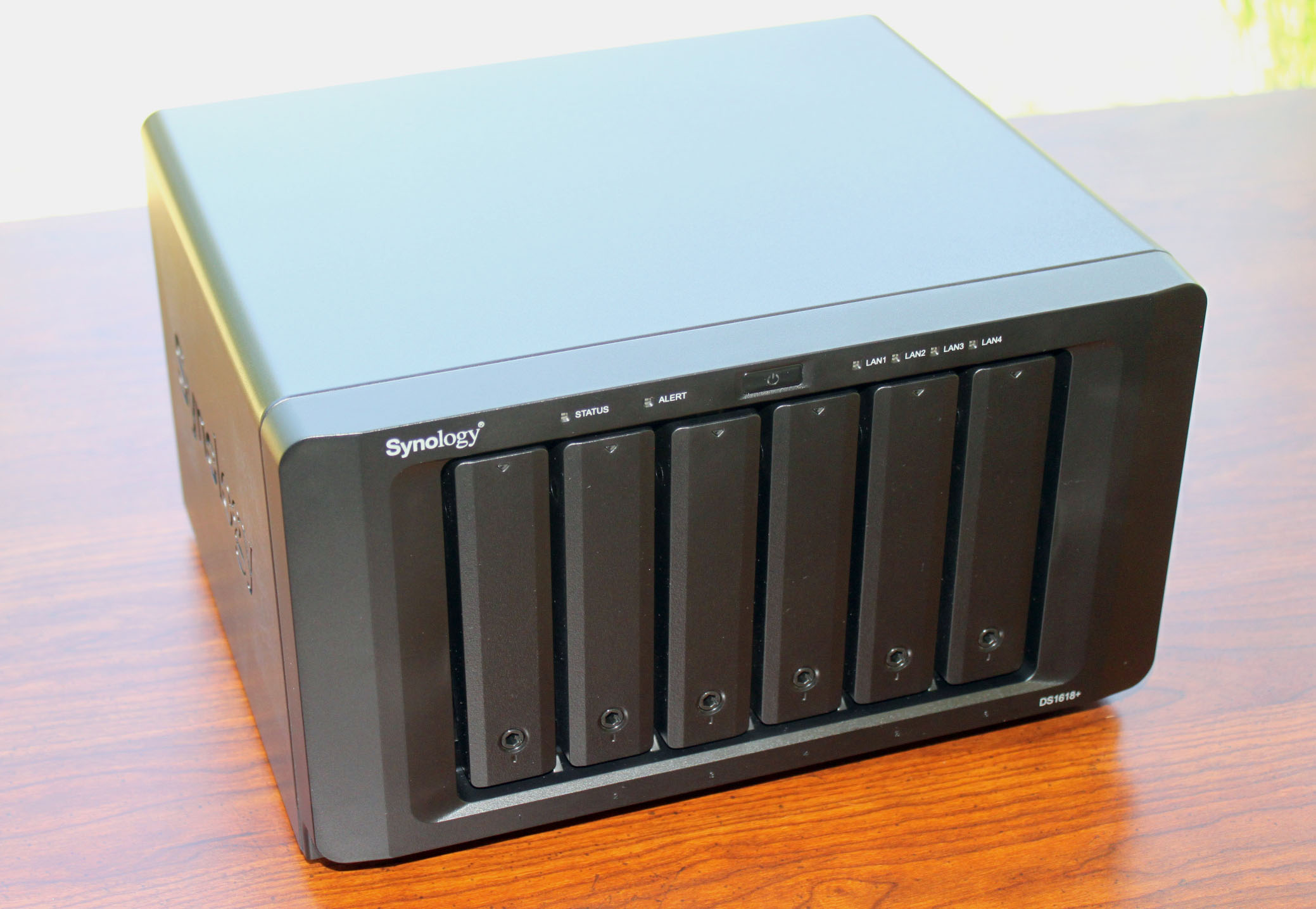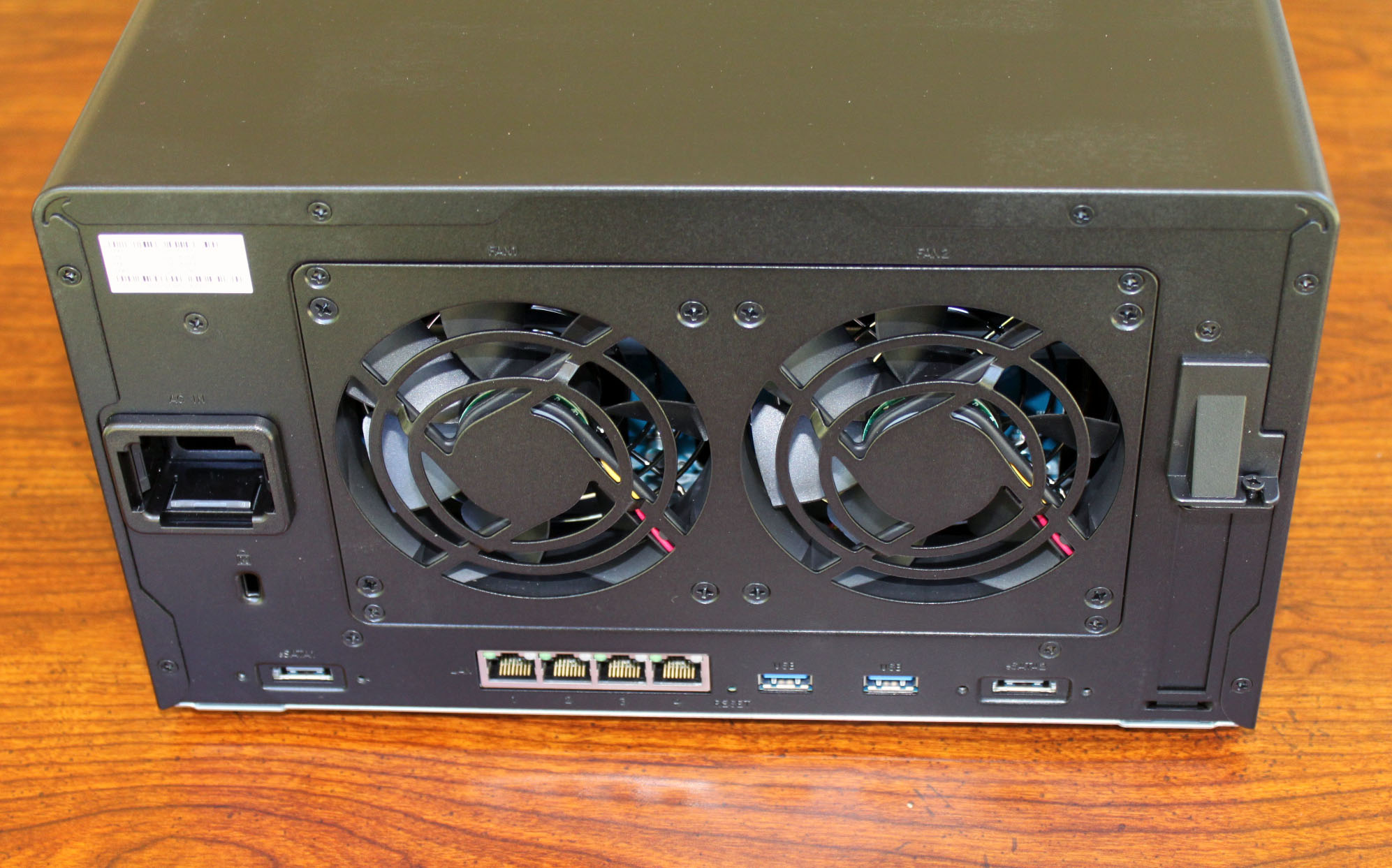- Qualcomm Launches Snapdragon 4 Gen 2 Mobile Platform
- AMD Launches Ryzen PRO 7000 Series Mobile & Desktop Platform
- Intel Launches Sleek Single-Slot Arc Pro A60 Workstation Graphics Card
- NVIDIA Announces Latest Ada Lovelace Additions: GeForce RTX 4060 Ti & RTX 4060
- Maxon Redshift With AMD Radeon GPU Rendering Support Now Available
The Synology DiskStation DS1618+: When The Great Gets An Upgrade
Synology has officially launched the DiskStation DS1618+, a six-bay prosumer NAS geared for anyone from enthusiasts to small and medium-sized businesses that need room to safely store, manage, and backup impressively large amounts of data. The DS1618+ marks the first Synology NAS utilizing Denverton C3000 Atom processors, replacing the aging five-year old Rangeley Atom C2000 series. The quadcore Atom C3538 sports a 2.1GHz clockspeed, a drop to the 14nm process node, and quadruple the L2 cache (8MB) over its predecessor.
The DS1618+ also upgrades the base RAM to a single 4GB DDR4-2133 SO-DIMM. At first glance some readers will quickly note it is non-ECC and dismiss the NAS. But for consumers or businesses that require ECC, the DS1618+ does allow the use of ECC RAM, as well as provide two SO-DIMM slots to populate with up to 32GB of memory. The C3538 is a dual-channel memory processor that will benefit from populating both RAM slots, but just don’t attempt to mix ECC and non-ECC RAM together when optimizing the NAS performance!
Synology doesn’t stop there, in addition to the option of ECC RAM support, Synology offers potential upgrades via the single built-in PCIe 3.0 x8 slot. Starting with single and dual 10GbE cards, Synology also offers the M2D17, a dual-slot M.2 card to allow a pair of SATA M.2 SSDs to be utilized as fast-cache drives. If at any point six drive bays still proves to be insufficient, a 5-bay DS517 can be plugged into each eSATA port to allow for a grand total of 16 hard disk drives to be managed from a single device. If 10GbE is not required, then the DS1618+ comes with four gigabit ports that support link aggregation and port failover. Consumers that require Wi-Fi functionality can even plug a Wi-Fi USB adapter into one of the three USB 3.0 ports and DiskStation Manager will recognize and use the wireless adapter accordingly.
With 12TB drives widely available and 14TB drives due out shortly, issues like bit-rot are becoming an ever-increasing concern for long-term data storage. To resolve this, Synology has been offering the “5th gen” Btrfs filesystem as an alternative to ext4, which allows for detection and self-healing of bit-rot and other silent data corruption. While the parity checksum issue of Btrfs and RAID 5/6 is well-publicized, Synology solves this by utilizing traditional Linux md raid in place of Btrfs for the RAID layer. The usual 0, 1, 5, 6, 10, F1 (for all-flash arrays) and JBOD options are supported, but Synology also offers its own Hybrid Raid option to make it easy for new users without any knowledge of RAID to get started. SHR will automatically utilize the best RAID option depending on the disks available and will waste significantly less space if mixed capacity disks are in use on the same NAS.
No NAS would be complete without a capable OS, and Synology has been rolling its own DiskStation Manager since 2003. Version 6.2 is due out at the end of the month and promises faster snapshot creation as well as more tools for easier snapshot management. Atomic COW Snapshots (yes that’s the actual name) with Btrfs allows for an instant freeze-frame capture of the filesystem with all inferences and metadata intact without requiring taking the array offline to perform the backup. Btrfs also enables differential snapshots, only transferring data that has changed between snapshots instead of propagating the entire array or folder image across the network.
In an interesting addition, Synology has partnered with Seagate to offer advanced IronWolf Health Management. As the name implies this functionality requires IronWolf or IronWolf Pro drives, but makes the advanced internal drive diagnostics available to the end-user. High temperatures, excessive vibration, a sudden kinetic jolt to the system, and even host interface communication errors are proactively monitored and will generate an alert that Synology’s NAS can pass directly to the user. In the unforseen (or is that inevitable?) failure of a hard disk IronWolf drives can generate a specific error code that the end-user can then give directly to a Seagate support representative for quicker and more accurate support service.
Synology’s DS1618+ is an impressive upgrade over the 5 & 8-bay models, even offering much of the functionality like ECC support of the DS30 series for less even after the added cost of ECC modules. As the photos imply, we will be taking a deeper dive into the hardware itself as well as DiskStation Manager in an upcoming review. As such, if our readers have any questions regarding the DS1618+, its hardware, software, or functionality feel free to drop us a comment on what you would like to see! The DS1618+ comes with a 3-year warranty that can be extended to five years in some regions, and is available now from most retailers starting at $799.





